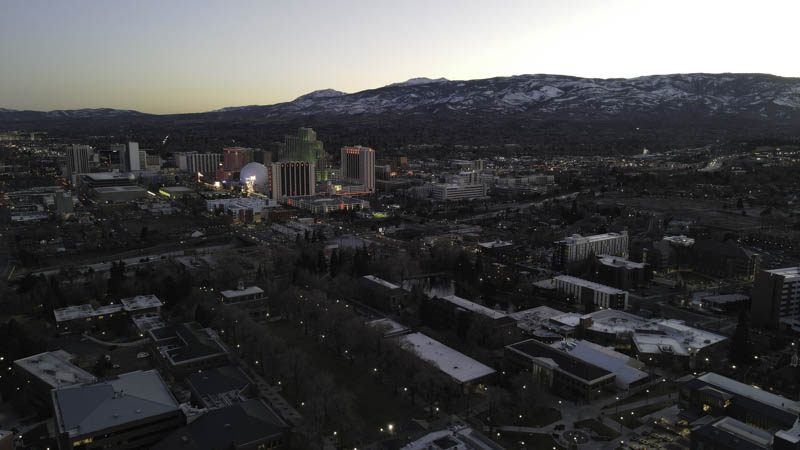Home » Cost Guides » Nevada Cost Guides » How Much Does it Cost to Build a House in Reno?
Nicknamed as the “Biggest Little City in the World,” Reno is known for its casino and tourism industry. Additionally, the interest of Francisco Bay Area companies like Amazon, Tesla, Panasonic, Microsoft, Apple, and Google in Reno has turned the area into one of America’s major technology centers. Reno’s economy is currently undergoing recovery from the effects of the COVID-19 pandemic, alongside the rest of northern Nevada.

The Cost of Building a Home in Reno
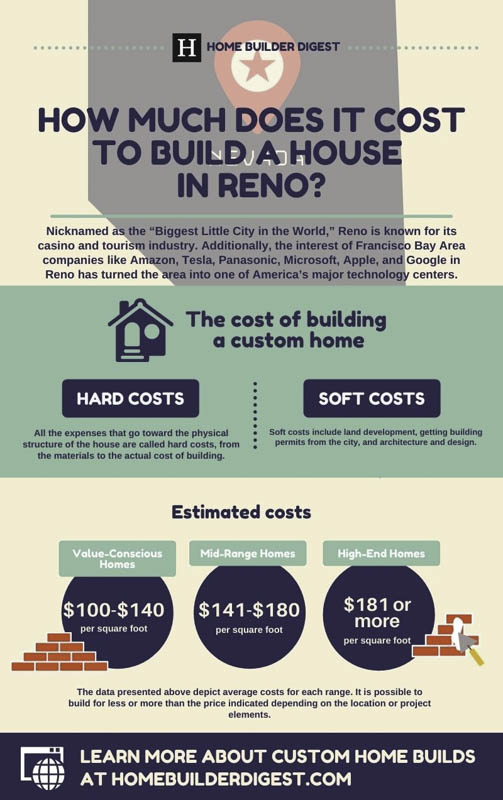
The economic recovery is being supported by an improvement in the employment rate, which is reaching its pre-pandemic levels. For the construction industry, some of the burdens of having a shortage of skilled workers will be alleviated. The pre-pandemic number of available workers was around 200 people, but now the numbers are 160 at a time despite needing at least 300 workers per project.
The low number of subcontractors was initially not enough to handle the demand for residential construction, which results in contractors dictating building prices and increasing costs.
Having more workers on board means construction firms will be able to meet the rising demand coming from an influx of new residents in the Truckee Meadows. Reno’s population is even expected to reach 520,000 by 2030. The shift towards new residential construction comes from the low supply of both real estate and rental inventory. Unfortunately, just as demand for housing continues to rise, the availability of certain construction materials goes down.
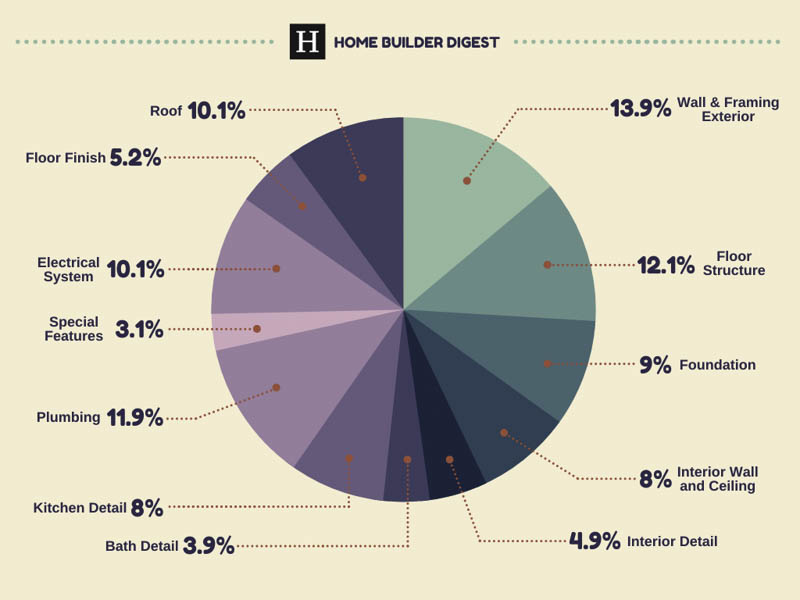
Figure 1. Typical cost breakdown of a single-family home constructed using the conventional method, according to Home Builder Digest. Image Source: National Cost Guide.
The national average of new home construction is about $207 per square foot. Reno, in comparison, is at around $160 per square foot. The actual cost per square foot, however, will vary based on the type and quality of the project. Most firms will charge $100 to $220 per square foot for the home building cost. Factors like location and contractor experience will also play a role in how much will be charged.
The total cost of construction will be a combination of hard and soft costs. Hard costs involve the physical aspect of the house, including framing, foundation, plumbing, flooring, and roofing among other things. Soft costs, on the other hand, are more along the lines of architecture and design fees, permit fees, and land costs. Hard and soft costs will fluctuate independently of each other, so project owners will have to pay careful attention to the details of a project.
Hard Costs
The total cost of new home construction in Reno can be anywhere from $100,000 to $8,000,000, depending on the work being done. Project owners can expect to see costs starting at $100 to $140 per square foot for standard-grade construction, although firms offering these prices may be difficult to find. It would be more common to see services being offered at the $141 to $180 per square foot range, usually for mid-value type homes. Anything within the $181 to $220 per square foot and above range will likely be for homes with a little more details and custom features. Luxury or high-end projects, meanwhile, are typically set in the $350 to $550 per square foot mark.
In addition to basic construction costs, project owners also have to factor in other hard costs like foundation, roofing, HVAC installation, and electrical installation.
According to a roofing firm, the cost of metal roofing has increased by 30 to 40%. For example, a metal roofing package that might have been $15,000 in the past now costs $20,000. Of course, pricing will differ based on the type of roofing. Some of the common price ranges of roofing are as follows:
HVAC installation in Reno will cost $2,224 to $11,120, depending on the type and number of units being installed. Flooring costs will vary based on the type being installed. Stone flooring can go anywhere from $15 to $28.91 per square foot, while wood flooring costs $6.80 to $32.80 per square foot. Wood flooring has a wider range because it takes into account the different wood tiles that could be used. Floor installation costs may be lowered if the project owner is only looking for labor and not materials.
Soft Costs
Get a free cost estimate
Soft costs cover the aspects of construction that are not physically part of the house itself. These costs include land, permit fees, and design and architecture fees.
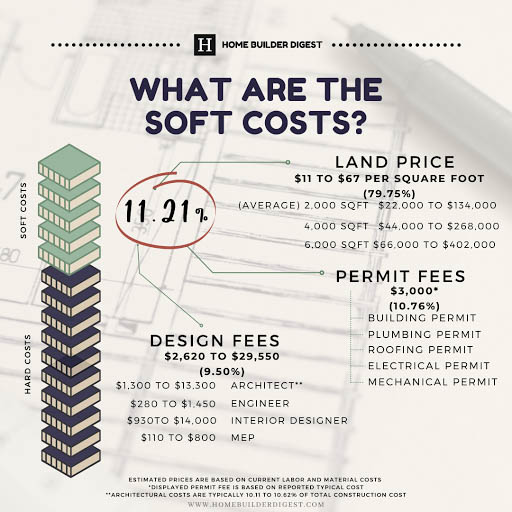
Figure 2. Soft cost percentage and average price range of additional fees, determined from the overall cost of custom home building in Reno.
Cost of the Land
With an influx of new residents coming into Reno, the local population is expected to reach 520,000 by 2030. Positive population growth will most likely result in an increase in land prices.
Redfin has an average lot price of $247,500 for lots in the Reno area. The cheapest lot is $20,000 and is located north of Reno/Tahoe International Airport. It is about 435,600 square feet. Meanwhile, the most expensive lot on Redfin for the area is $6,000,000 for 243,500.4 square feet in southwest reno.
In comparison, Zillow has an average lot price of $480,592.87. Its least expensive lot is $32,000 for 435,600 square feet, located on a hill with views. The most expensive listing is $7,500,000 for 217,800 square feet. This lot is located on Highway 431, in an area with mixed zoning.
Landwatch’s average lot price is $614,871.08, with the cheapest listing priced at $28,500 for 50,094 square feet. It is located in the Virginia Highland Ranches. The most expensive listing is $7,500,000 for 217,800 square feet, which is the same lot found among Zillow’s listings.

Permit and Other Fees
Details about applying for building permits in Reno can be found on the local government’s website. The city is now accepting electronic submissions for all building permit applications and plans. The online residential permit form can be found through this link, while other forms can also be found on the building permit page.
Applications can be submitted either in person or online. Paper plans must be submitted at Reno City Hall. For those who will be doing the online application, details can be found underneath the page’s online application tab. The Electronic Permit Submittal Business Rules and Process is also available for viewing. Application status can be seen on the ONE Regional Licensing and Permits site.
The total permitting costs will depend on details like the project’s square footage, number of floors, and overall valuation.
Building permits are based on valuation. According to the Building Permit Fee Schedule, the computation for total permit fees is as follows: Building Permit (based on valuation) + 65% of building permit fee (plan review) = Total Permit Fees. The following table features some figures taken from the building permit fee schedule.
Similar to building permits, MEP permits are based on valuation. The computations used are as follows:
- Mechanical: Building Permit (based on valuation) + 15% of building permit fee (plan review) = Total Permit Fees
- Electrical: Building Permit (based on valuation) + 20% of building permit fee (plan review) = Total Permit Fees
- Plumbing: Building Permit (based on valuation) + 20% of building permit fee (plan review)= Total Permit Fees
- Combined MEP: Building Permit (based on valuation) + 55% of building permit fee (plan review)= Total Permit Fees
The following table presents some figures taken from the MEP permit fee schedule:
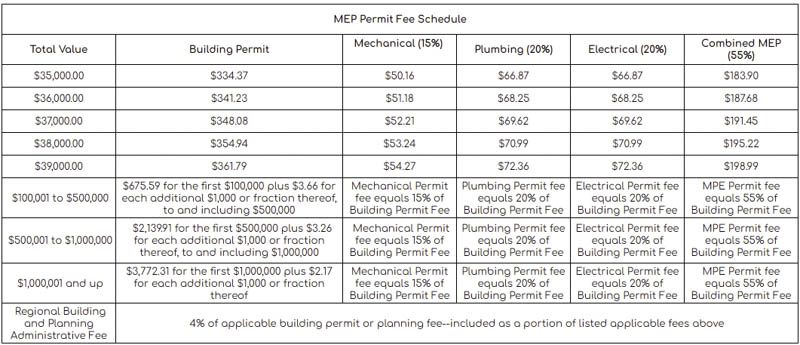
Architecture and Design Fees
Reno architects will common base their cost on the total cost of construction value while others charge either by the hour or on square footage. Most Reno architects will charge between $8 to $10 per square foot of living space. Prices will differ based on the work request, project location, and the architect’s position, experience, training, and reputation. Project owners can avail of services like layered drawings, project management, concept development, consultation, and site visits.
How do the custom home building costs in Reno compare to other nearby cities?
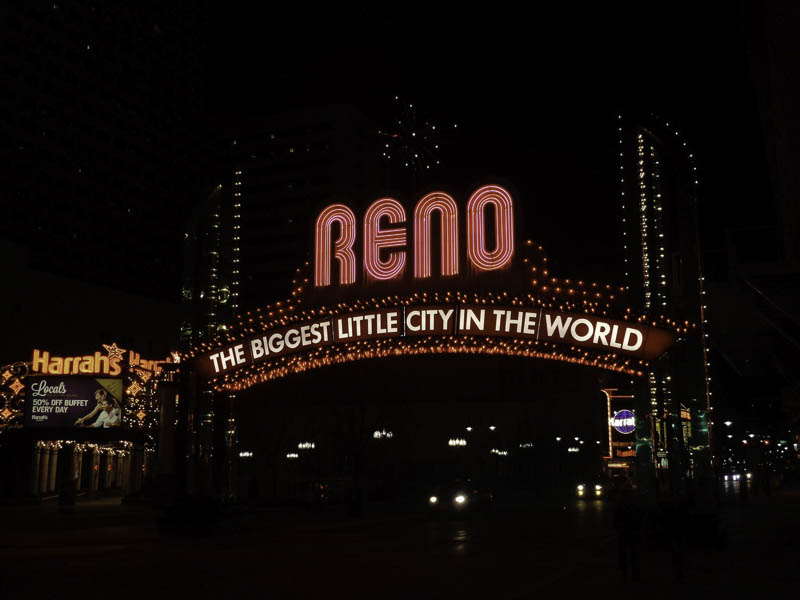
Data from the last five years gathered from online contractor marketplace BuildZoom (BZ) show that the average cost to build a house in nearby areas tends to be in the same range as Reno.
In Sparks, the average cost is $260,291.21. The lowest cost for the area is $166,195 while the highest cost is $600,000. Permits in Sparks are mostly for new residential buildings. Some are for single-family homes and some are for apartments. New single-family homes are usually one floor with garages, air conditioning, and a patio.
Sun Valley has slightly higher figures with the average cost being $280,178.82. Its lowest cost is $173,222 while its highest is $397,741. Sun Valley permits are usually classified as utility permits. Permits under the utility permit classification are used for things like water heaters, electrical, and gas pipes. The residential permits are usually for new single-family houses and additions. New single-family residences in Sun Valley are mostly two floors, with three to four bedrooms, three to four baths, a one to two-car garage, and a patio.
Carson has much higher costs, with an average of about $535,648.15. The lowest cost is $254,935, which can also reach up to $1,015,328. Carson City permits are mostly classified as residential permits. These permits are usually for new residential homes, water heaters, HVAC, photovoltaic systems, and other similar things. New residential homes in Carson City are usually one to three bedrooms, one to three bathrooms, and a garage.
What Leading Custom Home Builders and Architects that Serve the Reno Area Say
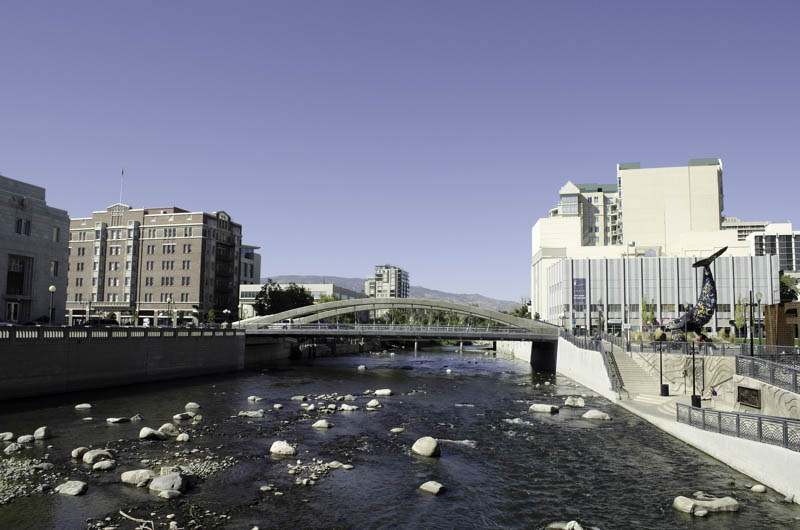
Co-owner of LakeCrest Builders Dave Pearce shared estimates for the overall square footage construction costs that project owners may come across for high-end luxury homes. He shared, “Two years ago, when asked what high end homes cost, I would tell clients to expect between $350 and $450 per foot. Today, I tell folks to expect between $450 and $550 per foot for high end homes in the Reno area.”
Pearce foresees a large number of inquiries for high-end custom homes. Should the current demand trends remain the same, prices will likely not be levelling out. He noted, however, that it is not sustainable and is hopeful about seeing prices level out during the fall. The construction industry trends are cyclical, with demand being in the highs between 2000 and 2006, in the lows during the Great Recession, and the highs again once demand started to climb in 2012.
“My advice to anyone considering a new home would be to get started with your architectural drawings now, and get budgets established, you can always put the project on hold, but pricing is not coming down any time soon,” Pearce said, expecting the current trend to continue for at least two or three more years.
The Future of Reno’s Residential Construction Industry
Following the national trend, Reno is experiencing a shortage in housing supply. The real estate and construction industries are having difficulties in meeting the high demand for homes. In addition to a low housing supply, there is also a shortage of skilled labor. The lower number of subcontractors available to work gives firms the ability to increase their prices.
Affordable Housing
There is currently a large demand in the Clark and Washoe counties for housing projects. About 14 affordable housing developments are in progress in Nevada, most of which are expected to be completed by 2024. Some of these projects are senior and family complexes.
The high demand for affordable housing and a limited supply result in a long waiting period for people looking for a place to live. Some areas have what is called “naturally occurring affordable housing,” which are rental properties unsupported by public subsidies for low-income households. Unfortunately, these naturally occurring affordable housing spots are being knocked down to make way for redevelopment plans. Reno renters are being affected by a housing affordability crisis as a result of rapid population growth outpacing the rate of home construction and local wages.
Considering building a home in Reno?
Contact us for a free consultation

